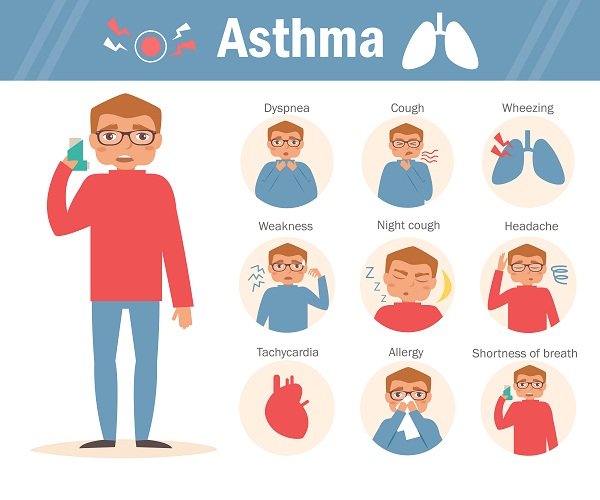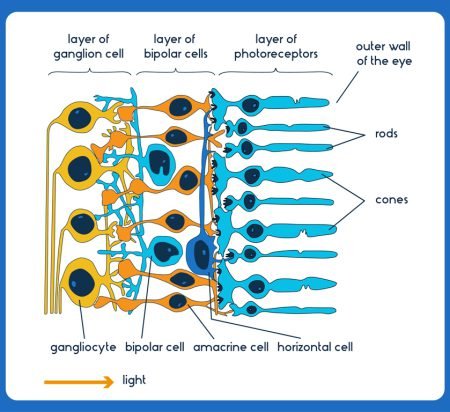Asthma Symptoms and Signs: Is It Asthma?
- Updated on: Jul 10, 2024
- 3 min Read
By
- Published on Oct 3, 2019

Asthma is the condition of inflammation of the airways with increased production of mucus inside the tube. People with asthma start experiencing the symptoms when the airways swell, tighten or fill with the sticky secretions (mucus).
Mild symptoms of asthma last a few minutes while severe asthma symptoms last for hours or days. Mild symptoms may be annoying for the patient while the severe symptoms are the real troublesome and they disturb the daily routine of a patient.
Symptoms of asthma along with their occurrence and severity may change with time.

Characteristics of asthma symptoms
- The symptoms of asthma are not same for everyone.
- Symptoms may range from mild to severe.
- Any symptom can be serious and can become deadly if not treated on time.
- There are situations when a patient does not experience the symptoms for some time and also when different symptoms are experienced.
- Symptoms of asthma also differ with one asthma attack to another (mild in one attack and severe in another).
- Some symptoms are not seen even for extended periods.
- Some symptoms are experienced every day.
- Some people may experience symptoms during some specific actions such as during exercise, or viral infections like colds.
- Severe symptoms should not be ignored as they are fatal. They should be treated at the first sight.
- Proper treatment helps patient to reduce the severity of asthma symptoms.
What are the signs and symptoms of Asthma?
There are millions of people around the world who suffer from asthma. And hundreds of them die every year. Asthma is a scary condition but still it can be controlled. But for controlling the disease, knowledge about the disease and its symptoms is necessary.
Some of the common symptoms of asthma are given below:
Coughing
Coughing is the main symptom of asthma. It can occur during the day or at night. But mostly it occurs at night and interrupts sleep.
Coughing also increases with exercise or when laughing. The cough is usually dry and non-productive (does not expel any mucus).
Respiratory problems
The various respiratory problems faced by asthmatics are given below:
Difficulty in breathing
People with asthma often find difficulty in breathing. As the airways are inflamed, one may have problems in breathing normally. Asthmatics usually cannot catch their breath as they feel out of breath. They also feel like they are not getting enough air out of lungs.
Wheezing
Wheezing is a whistling sound that comes from the chest while breathing. It is mainly experienced while exhaling. But all who wheeze are not asthmatic and all asthmatics do not necessarily wheeze.
Breathing through mouth
It is often noticed that people with asthma breathe through their mouth. It is because they have a problem while breathing through the nose because of the inflamed airways.
Fast breathing
Fast breathing occurs when an individual takes more breaths than normal in a given time.
Frequent respiratory infections
The triggers cause the symptoms of asthma like inflammation and tightening of the airways. This can lead to various respiratory infections.
Difficulty speaking
The people with asthma find difficulty in speaking in the following ways:
- They have trouble finishing a complete sentence without taking another breath.
- Long sentences are most difficult to speak in one go.
- Sometimes short phrases can be hard to complete.
- Just before asthma attack, speaking a few words is even difficult.
Chest tightness
A person with asthma may feel a pressure on the chest or may feel as something is lying on the chest. They may also find it difficult to breathe deeply. Chest congestion or chest pain usually accompanies chest tightness.
Anxiety
Anxiety is a feeling of unease, worry or fear. When an individual finds it difficult to breathe, he may feel uneasiness and discomfort.
Early awakening
Approximately 51 percent of asthmatic patients find their sleep disturbed due to early awakening. Other disturbing factors are difficulty in maintaining sleep and daytime sleepiness.
Early awakening is also sometimes caused because of cough and breathing problems.
Feeling very tired or weak when exercising
Exercise stresses the body. And stress is cumulative. Other symptoms of asthma such as early awakening, respiratory problems and anxiety add to the stress and make the body feel weaker during a vigorous activity such as while working out.
When should I meet a doctor?
The symptoms discussed above can be caused by a number of various factors but they indicate asthma if they:
- happen often and keep coming back
- are common and worse at night and early in the morning
- occur in response to an asthma trigger like exercise or exposure to an allergen (such as pollen or animal fur)
Meet your doctor if the above listed conditions are noted.











